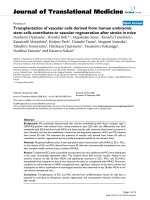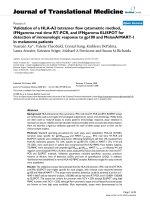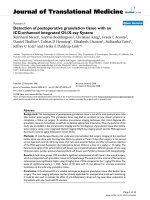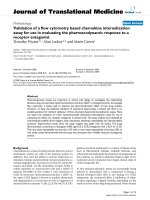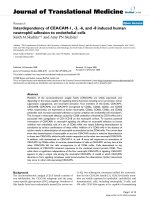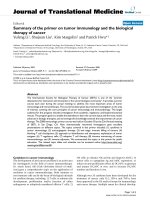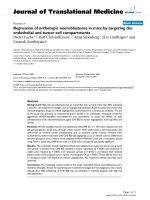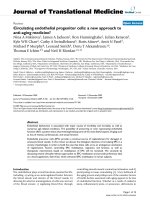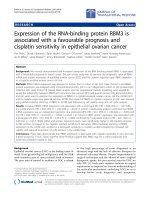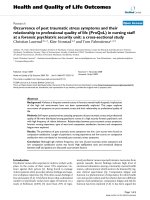báo cáo hóa học: " Integration of immigrants into a new culture is related to poor sleep quality" pptx
Bạn đang xem bản rút gọn của tài liệu. Xem và tải ngay bản đầy đủ của tài liệu tại đây (192.1 KB, 6 trang )
BioMed Central
Page 1 of 6
(page number not for citation purposes)
Health and Quality of Life Outcomes
Open Access
Research
Integration of immigrants into a new culture is related to poor sleep
quality
Ursula Voss*
1,2
and Inka Tuin
3
Address:
1
Dept. of Psychology at the J.W. Goethe-University Frankfurt/M., Mertonstr. 17, 60054, Frankfurt/M., Germany,
2
Dept. of Cognitive
Psychology at the Rheinische Friedrich-Wilhelms-University Bonn, Kaiser-Karl-Ring 9, 53111, Bonn, Germany and
3
Clinic for Psychosomatic
Medicine and Psychotherapy at Johannes Gutenberg University Mainz, Germany
Email: Ursula Voss* - ; Inka Tuin -
* Corresponding author
Abstract
Background: This article reports on the relationship between cultural influences on life style,
coping style, and sleep in a sample of female Portuguese immigrants living in Germany. Sleep quality
is known to be poorer in women than in men, yet little is known about mediating psychological and
sociological variables such as stress and coping with stressful life circumstances. Migration
constitutes a particularly difficult life circumstance for women if it involves differing role
conceptions in the country of origin and the emigrant country.
Methods: The study investigated sleep quality, coping styles and level of integration in a sample of
Portuguese (N = 48) and Moroccan (N = 64) immigrant women who took part in a structured
personal interview.
Results: Sleep quality was poor in 54% of Portuguese and 39% of Moroccan women, which
strongly exceeds reports of sleep complaints in epidemiologic studies of sleep quality in German
women. Reports of poor sleep were associated with the degree of adoption of a German life style.
Women who had integrated more into German society slept worse than less integrated women in
both samples, suggesting that non-integration serves a protective function. An unusually large
proportion of women preferred an information-seeking (monitoring) coping style and adaptive
coping. Poor sleep was related to high monitoring in the Portuguese but not the Moroccan sample.
Conclusion: Sleep quality appears to be severely affected in women with a migration background.
Our data suggest that non-integration may be less stressful than integration. This result points to
possible benefits of non-integration. The high preference for an information-seeking coping style
may be related to the process of migration, representing the attempt at regaining control over an
uncontrollable and stressful life situation.
Background
The present study was part of a project investigating the
impact of social background on sleep quality in women in
Germany. We report on the relationship between cultural
influences on life style, coping style, and sleep in a sample
of female Portuguese immigrants and compare it to a sam-
ple of female Moroccan immigrants living in Germany.
Epidemiological studies conducted in Western societies
show poorer sleep quality and a higher proportion of psy-
Published: 10 August 2008
Health and Quality of Life Outcomes 2008, 6:61 doi:10.1186/1477-7525-6-61
Received: 29 April 2008
Accepted: 10 August 2008
This article is available from: />© 2008 Voss and Tuin; licensee BioMed Central Ltd.
This is an Open Access article distributed under the terms of the Creative Commons Attribution License ( />),
which permits unrestricted use, distribution, and reproduction in any medium, provided the original work is properly cited.
Health and Quality of Life Outcomes 2008, 6:61 />Page 2 of 6
(page number not for citation purposes)
cho-physiologic sleep disorders such as primary insomnia
in women compared to men [1,2]. The incidence of psy-
cho-physiologic sleep disorders is known to be causally
related to socio-economic and stress-related psychological
variables [for a review see [3]]. Yet, the impact of socio-
economic and psychological factors on sleep in relation to
gender differences has received little attention.
A recent study found poor sleep quality suggestive of
insomnia in 39% of female Moroccan immigrants living
in Germany [3], confirming previous findings marking
immigration a health and sleep-relevant stress factor [4-
9]. By comparison, the prevalence of insomnia in the Ger-
man population has been found to be relatively low
(6.2%) [10]. Surprisingly, Moroccan women who had
identified with a more Western lifestyle had a higher inci-
dence of insomnia than women who had retained their
traditional Moroccan life style, suggesting that for Moroc-
can immigrant women in Germany, adopting a Western
life style may be more stressful than retaining the native
life style. Possibly, non-integration serves a protective
function. Further, an unusually large proportion of
women preferred an information seeking (monitoring)
coping style, which has been shown to be predictive of
psycho-physiologic or primary insomnia in Western
women [11]. Monitoring is defined by an overreaching
desire to obtain information in uncontrollable situations
[12], most likely motivated by the attempt to obtain con-
trol over a threatening situation [13]. Monitoring consti-
tutes an extreme coping style, which is, however, preferred
by as much as 13% of the Western population [14]. Gen-
der differences have been established in German [15],
Austrian [14], and Dutch [16], but not in Spanish [17] or
North-American samples [12], suggesting that cultural
factors play a role. In German, Austrian and Dutch sam-
ples women are stronger information seekers than men.
Unlike in Western women [11], elevated monitoring
scores in the Moroccan sample were not predictive of poor
sleep. Another unusual finding concerns adaptive coping
which was also very pronounced in female Moroccan
immigrants. Adaptive coping constitutes a flexible
approach to handle stress: information is preferred in sit-
uations that are controllable through early intervention.
By contrast, distraction and avoidance (blunting) are prac-
ticed in situations that are not to be controlled. Although
adaptive coping constitutes the healthiest stress response,
this strategy is only applied by 5% of Western women. By
contrast, 19% of the studied Moroccan immigrant women
engaged in adaptive coping [14,16]. While these findings
suggest that poor sleep and coping style preference are
influenced by cultural factors, the observed relationships
between life style, coping style, and sleep were not antici-
pated. To investigate whether these results are typical for
female immigrants in Germany, or whether culture-spe-
cific factors such as religious preferences or social position
of women in their families, for example, have to receive
higher weighting, the interview was repeated with a group
of female Portuguese immigrants living in Germany,
assessing sleep quality, coping style and life style. Women
in the Portuguese sample are similar to the Moroccan
sample regarding socio-economic factors such as educa-
tion, age, and immigration status. They differ in their reli-
gious orientation (Catholic vs. Moslem) and their
stronger proximity to a Western life style in their country
of origin [18].
Methods
Participants
Portuguese sample
The study was approved by the local ethics committee of
the Department of Medicine of the J. W. Goethe-Univer-
sity Frankfurt, Germany. Written informed consent was
obtained from all participants prior to the interview.
The sample size was planned at 80 participants, assuming
a strong effect size of .8 (α = .05, power = 80%) [19]. How-
ever, only 48 women agreed to participate. Similar to
women in the Moroccan sample, Portuguese women were
very hesitant to participate. Several a priori conversations
with husbands and other family members were necessary
to dispel doubts about the protection of privacy and the
purely scientific nature of the investigation. Due to low
levels of literacy and poor German language skills, a
female Portuguese translator was present at all times. For
the same reasons, interviews were conducted individually,
each interview lasting for three hours, on average.
Exclusion factors were pregnancy, previously diagnosed
sleep disorder, and chronic disease that may be related to
sleep quality. Participants were recruited through per-
sonal contacts and by word-of-mouth recommendation.
Because most women socialized only within small circles
of neighbors and family, all participants were residents of
the Mainz and Frankfurt urban area. Interviews were con-
ducted at the women's homes or in public places chosen
by the participants (coffeehouses, neighborhood circles).
Interview questions were translated into Portuguese by
professional translators and translated back into German
by the accompanying translators. The interview was iden-
tical to the one given to the Moroccan women. Internal
consistency (Cronbach's alpha) for the PSQI total score
was .77 (comparable Moroccan sample: .80 [3]; German
sample: .89 [20]; American sample: .82 [21]. The four
scales of the FMBS had internal consistencies between .68
(monitoring in controllable situations) and .75 (blunting
in uncontrollable situations) (comparable German sam-
ple: .70 – .79 [14]. Participants received 20 Euro as com-
pensation for their time.
Health and Quality of Life Outcomes 2008, 6:61 />Page 3 of 6
(page number not for citation purposes)
Moroccan sample
A total of 64 Moroccan women participated in the inter-
view. Similar to the Portuguese study, a translator was
present for all interviews. Interview questions were identi-
cal in both samples and professional translations of struc-
tured questions had been translated back into German by
the respective translators. A detailed description of the
Moroccan sample can be found elsewhere [3]. On average,
Moroccan women were younger (31.72 years) than Portu-
guese women (31.72 vs. 38.60 years, t = 2.95, p < .01).
Portuguese women had been living in Germany longer
than Moroccan women (20.29 vs. 14.00 years, t = 3.37, p
< .01).
Measures
Structured Interview
Socio-demographic information, including age at immi-
gration, number of years spent in Germany, years of
schooling, and occupational status, were collected in
structured interviews. In addition, women were asked to
rate their religious customs and life-style-related behav-
iors. A 4-point rating scale was used in all questions. In
accordance to literature reports on influences on cultural
identity [22], women were categorized into 4 groups on
the basis of four measures: 1) religious customs (self rat-
ing of Christian religiousness), 2) self-rated life style (Ger-
man, partially adapted German, predominantly
Portuguese, strictly Portuguese), 3) years since immigra-
tion (second generation immigrants, immigration in
childhood, less than 10 years or more than 10 years since
immigration), 4) translator-rated German language skills
(perfectly fluent in German, rather fluent, simple lan-
guage skills, spoke no German). Language skill ratings
were discussed with and in agreement with the participat-
ing women. In these four categories, each score received
an equal weighting of 25%. Weighted scores were then
summed up (score range: 34 – 100) and split into 4
groups: 1) German life-style (scores 25 – 40), 2) rather
German life style (scores 41 – 55), 3) rather traditional life
style (scores 56 – 70), 4) strictly traditional life style
(scores 71 – 85). This procedure matched the one applied
to the data of the Moroccan sample. Socio-demographic
data for Portuguese and Moroccan women are listed in
Table 1 [see additional file 1].
Pittsburg Sleep Quality Inventory (PSQI)
Sleep quality was assessed with the Pittsburgh Sleep Qual-
ity Index (PSQI), a self-rated questionnaire that provides
an index of sleep quality for a 1-month interval [23]. The
PSQI comprises 19 questions which are grouped into 7
component scores, each weighted equally on a 0 to 3
scale. The 7 component scores are then totalled to provide
a global PSQI score, which has a range of 0 to 21, with
higher scores indicating worse sleep quality. The PSQI has
established reliability (.82 – .89) and validity (specificity
rates to the clinical diagnosis of insomnia: 80 – 100%).
Global scores > 6 were interpreted as an indicator of poor
sleep quality and a strong indication for insomnia.
Frankfurt Monitoring and Blunting Scales (FMBS)
Coping style was assessed by a modified version of the
Frankfurt Monitoring Blunting Scales (FMBS). The FMBS
have good reliability and validity [14] and comprise four
uncontrollable and threatening situations and four con-
trollable yet stressful situations. Each situation is followed
by eight behavioral choices, four pertaining to a monitor-
ing and four to a blunting, i.e. distracting style of coping.
Participants are asked to anticipate each scenario and rate
how likely they would engage in each of the eight behav-
ioral choices. The item scores are summed within each sit-
uational type, resulting in four composite scores, one for
each monitoring and blunting in uncontrollable and con-
trollable situations. Individuals are classified as rigid
"monitors" (high monitoring scores in controllable and
uncontrollable situations) or "blunters" (high blunting
scores in controllable and uncontrollable situations) or
"adaptive copers" (high monitoring scores in controllable
situations and high blunting scores in uncontrollable sit-
uations) or "unspecified types" on the basis of their
scores. Unspecified types refer to participants who are nei-
ther monitors nor blunters nor adaptive copers. As in the
Moroccan interview, two controllable situations of the
original FMBS were exchanged for more housebound sit-
uations, because preliminary interviews suggested that the
original situations could not be anticipated for cultural
reasons. Alterations to the FMBS were identical for both
the Moroccan and the Portuguese group.
Results
As can be seen from table 1 [see additional file 1], 38% of
Portuguese women had adopted a German or rather Ger-
man life style. By contrast, 62% adhere to a life style typi-
cal for their country of origin. This result compares well to
the data from the Moroccan sample (45% vs. 55%). Most
women in both samples were married (79% of Portuguese
and 59% of Moroccan women), only one Portuguese
woman was divorced (2%) (Moroccan women: 13%).
With respect to continuous variables age, years since living
in Germany, and years of schooling, analysis of variance
(ANOVA) showed that life style was significantly influ-
enced by years of schooling in both samples (Portuguese
women: F = 15.18, df = 3, 44, p < .01, Moroccan women:
F = 5.13 df = 3,60, p < .01). Posthoc procedures (Scheffé)
revealed that a stronger integration (German or rather
German life style) was associated with longer schooling.
In the Portuguese sample, life style was also influenced by
age (F = 7.81, df = 3, 44, p < .01), showing that more inte-
grated women were younger than more traditional
women. In the Moroccan sample, integration was favored
Health and Quality of Life Outcomes 2008, 6:61 />Page 4 of 6
(page number not for citation purposes)
in women who had lived in Germany longer (F = 12.14,
df = 3,60, p < .01).
Regarding coping styles [additional file 1], the percentage
of monitors in this sample matched the percentage found
in the Moroccan sample (48%). The percentage of adap-
tive copers was higher than in German (6%) and Austrian
women (3%) but lower than in the Moroccan immigrant
sample (19%). Similar to the findings in the Moroccan
sample, the percentage of blunters in the current sample
was inconspicuous.
With respect to sleep, a total of 54% of Portuguese and
39% of Moroccan women had PSQI scores above 6, which
is indicative of a sleep disorder. Nonparametric χ
2
analy-
ses were performed on PSQI groups (good and poor sleep-
ers) for life style [see additional file 1] and coping style
types (monitors, blunters, adaptive copers, unspecified
types) [see additional file 2]. Results show significant dif-
ferences between good and poor sleepers for life style in
both groups (Portuguese sample: χ
2
= 8.88, df = 3, p < .05,
Moroccan sample: χ
2
= 8.11, df = 3, p < .05). Poor sleep
was related to coping style in the Portuguese (χ
2
= 8.71, df
= 3, p < .05) but not the Moroccan sample. As can be seen
from table 1 [additional file 1], a German life style is asso-
ciated with poorer sleep than more traditional life styles.
Table 2 [additional file 2] shows that the coping style
"monitor" is associated with poor sleep in Portuguese
women, confirming earlier results reported for German
women [11] and standing in contrast with results from
the Moroccan immigrant sample which showed better
sleep in monitors. Since sleep quality may also be influ-
enced by body mass index (BMI) and age, ANOVAs were
conducted on PSQI groups and dependent variables age
and BMI. Both variables did not show significant effects
on sleep quality [additional file 2] in either group.
Discussion
In the sample of Portuguese immigrant women living in
Germany, we found similarities with the Moroccan group
of female immigrants with regard to sleep quality and life
style and dissimilarities with respect to coping.
In both studies, the total percentage of women suffering
from poor sleep was higher than that reported in most
epidemiologic studies of women in Western culture
[24,25], confirming that immigration is a health-relevant
life stressor. Further, the fact that the adoption of a Ger-
man life style was associated with poor sleep in both sam-
ples, suggests that the process of societal integration
appears to have a negative effect on sleep quality. This
confirms the hypothesis that non-integration serves a pro-
tective function with respect to sleep quality.
Age and BMI did not significantly affect sleep quality in
either sample, although psycho-physiological insomnia
has often [e.g. [26]] but not always [27] been found to be
elevated around middle age. We can only speculate
whether this finding is related to cultural or nutritional
factors. It is also possible that the generally more active
hypothalamic-pituitary-adrenal axis in women contrib-
utes to a greater variability in sleep quality among women
of all ages, blurring the specific effects of menopause in
this sample [28], for a detailed discussion see [3].
Regarding coping style, the majority of monitors in the
Portuguese sample were poor sleepers, while all blunters
slept well. This is in accordance with previous findings in
German women [11] but in contradiction to the results
from the Moroccan sample. Since copings style is inde-
pendent of age and socio-economic factors, we can only
speculate that perhaps the Moroccan women interviewed
expressed the wish for information rather than actual cop-
ing style. It may also be that anxiety was a moderating fac-
tor in this sample. Future studies should, therefore, assess
social desirability and anxiety. The overall percentage of
monitors in the Portuguese sample (48%) was just as ele-
vated as in the Moroccan sample (48%). In the Portuguese
but not the Moroccan sample, monitoring was more fre-
quent in women who had adopted a more German life
style. Also, a higher percentage of immigrant women than
German or Austrian women preferred adaptive coping,
supporting the assumption that coping style is somehow
related to the act of immigration. Either a selection bias
applies, meaning that women who are monitors or adap-
tive copers immigrate more readily to a foreign country
than women who prefer a non-monitoring coping style.
Alternatively, the change of domicile and exposure to a
new cultural environment may evoke the need for infor-
mation as a means of orientation. This would imply that
coping style is not so much a personality variable (trait)
but modifiable, at least in chronically stressful situations
such as immigrating to a foreign country. Further research
is needed to establish whether the results found for female
German immigrants also apply for immigrants to other
countries. Regarding coping style, results generate new
hypotheses about the weighting of personality and situa-
tive influences on coping with stress.
Conclusion
The results of this study confirm the finding from the
Moroccan immigrant study, showing that integration into
German culture is related to poor sleep quality. Moreover,
information seeking or monitoring seems to be the most
preferred coping style among female immigrants, inde-
pendent of religious customs and beliefs. Monitoring is
more than twice as prevalent in both groups of female
immigrants compared to non-immigrant Germans, sug-
gesting that coping style is related to the act of immigra-
Health and Quality of Life Outcomes 2008, 6:61 />Page 5 of 6
(page number not for citation purposes)
tion. Uncertainty and insecurity related to life
circumstances in a new country may trigger the need to be
alert and to excessively seek information, even in uncon-
trollable situations in which information is not useful.
Why poor sleep quality was related to monitoring in the
Portuguese sample but not in the Moroccan sample,
remains unclear. Possibly, Moroccan women adhering to
a traditional Moroccan life style felt a high need for infor-
mation and expressed their wish for information instead
of actual access to it. The finding in the Moroccan sample
may also be related to sociological issues like social net-
working, favouring information exchange between tradi-
tional women. Further studies should address these
issues.
Competing interests
The authors declare that they have no competing interests.
Authors' contributions
Ursula Voss designed the study, instructed and supervised
the interviewers, carried out the statistical analyses and
drafted the manuscript. Inka Tuin conceived of the study,
participated in its coordination and the statistical analysis,
and helped to draft the manuscript. All authors read and
approved the final manuscript.
Additional material
Acknowledgements
This study was supported by a government grant from Hessisches Ministe-
rium für Wissenschaft und Kunst (sleep disorders in women). The funding
body had no influence on study design, the collection, analysis, and inter-
pretation of data, or on the writing of the manuscript and did not play a role
in the decision to submit the manuscript for publication.
References
1. Dzaja A, Arber S, Hislop J, Kerkhofs M, Kopp C, Pollmacher T, Polo-
Kantola P, Skene D, Stenuit P, Tobler I, Porkka-Heiskanen T:
Women's sleep in health and disease. J Psychiatr Res 2005,
39:55-76.
2. Ohayon M: Epidemiological study on insomnia in the general
population. Sleep 1996, 19(Suppl):S7-S15.
3. Voss U, Tuin I: Relationship of Sleep Quality with Coping and
Life Styles in Female Moroccan Immigrants in Germany.
Womens Health Issues 2008, 18(3):210-216.
4. Jablensky A, Marsella AJ, Ekblad S, Orley J: Refugee mental health
and well-being: conclusions and recommendations. In Amidst
Peril and Pain: The Mental Health and Well-Being of the World's Refugees
Edited by: Orley J. Washington: American Psychological Association;
2001.
5. Kim Y, Grant D: Immigration Patterns, Social Support, and
Adaptation among Korean Immigrant Women and Korean
American Women. Cult Divers Ment Health 1997, 3:235-245.
6. Knipscheer J, Kleber R: Help-Seeking Attitudes and Utilization
Patterns for Mental Health Problems of Surinamese
Migrants in the Netherlands. J Couns Psychol 2001, 48:28-38.
7. Lin KM, Lau JK, Yamamoto J, Zheng YP, Kim HS, Cho KH, Nakasaki
G: Hwa-Byung: A community study of Korean Americans. J
Nerv Ment Dis 1992, 180:386-391.
8. Pang K: Hwabyung: The construction of a Korean popular ill-
ness among Korean elderly immigrant women in the United
States. Cult Med Psychiat 1990, 14:495-512.
9. Rosmond R, Nilsson A, Bjorntorp P: Psychiatric ill health and dis-
tribution of body fat mass among female immigrants in Swe-
den. Public Health 2000, 114:45-51.
10. Ohayon M, Zulley J: Correlates of global sleep dissatisfaction in
the German population. Sleep 2001, 24:780-787.
11. Voss U, Kolling T, Heidenreich T: Role of Monitoring and Blunt-
ing Coping Styles in Primary Insomnia. Psychosom Med 2006,
68:110-115.
12. Miller S: Monitoring and blunting: validation of a question-
naire to assess styles of information seeking under threat.
J
Pers Soc Psychol 1987, 52:345-53.
13. Kohlmann C: Stressbewältigung und Persönlichkeit: Flexibles
versus rigides Copingverhalten und seine Auswirkungen auf
Angsterleben und physiologische Belastungsreaktionen.
[Coping and personality: flexible vs. rigid coping behavior
and ist effects on anxiety and physiological stress]. Stuttgart:
Huber; 1990.
14. Voss U, Müller H, Schermelleh-Engel K: Towards the assessment
of adaptive vs. rigid coping styles: Validation of the Frankfurt
Monitoring Blunting Scales by means of confirmatory factor
analysis. Pers Indiv Differ 2006, 41:295-306.
15. Voss U: Überwachen und Schlafen [Monitoring and Sleep].
Frankfurt: Lang; 2001.
16. Muris P, de Jong P: Monitoring and the perception of threat.
Pers Indiv Differ 1993, 15:467-470.
17. Morin C, Rodrigue S, Ivers H: Role of stress, arousal, and coping
skills in primary insomnia. Psychosom Med 2003, 65:259-267.
18. Migration und Bevölkerung: Deutschland: Mehr Menschen mit
Migrationshintergrund. Migration und Bevölkerung 2008, 3:2-3.
19. Lenth RV: Java Applets for Power and Sample Size [Compu-
ter software]. 2006 [ />].
20. Backhaus J, Niemann T, Hohagen F, Riemann D, Junghanns K: Test-
retest reliability of the Pittsburgh Sleep Quality Index
(PSQI) in patients with primary insomnia. World J Biol Psychia
2001, 2:374-377.
21. Gentili A, Weiner D, Kuchibbatla M, Edinger J: Test-retest reliabil-
ity of the Pittsburgh Sleep Quality Index in nursing home
residents. J Am Geriatr Soc 1995, 43:1317-1318.
22. Halligan P: Caring for patients of Islamic denomination: criti-
cal care nurses' experiences in Saudi Arabia. J Clin Nurs 2006,
15:1565-1573.
23. Buysse D, Reynolds C III, Monk T, Berman S, Kupfer D: The Pitts-
burgh Sleep Quality Index: A new instrument for psychiatric
practice and research. Psychiat Res 1989, 28:193-213.
24. Hohagen F, Rink K, Käppler C, Schramm E, Riemann D, Weyerer S,
Berger M: Prevalence and treatment of insomnia in general
practice. A longitudinal study. Eur Arch Psy Clin N 1993,
242:329-336.
25. Pearson N, Johnson L, Nahin R: Insomnia, Trouble Sleeping, and
Complementary and Alternative Medicine: Analysis of the
2002 National Health Interview Survey Data. Arch Intern Med
2006, 166:1775-1782.
26. Morin C, LeBlanc M, Daley M, Gregoire JP, Merette C: Epidemiol-
ogy of insomnia: prevalence, self-help treatments, consulta-
tions, and determinants of help-seeking behaviors. Sleep Med
2006, 7:123-130.
Additional file 1
Socio-demographic data. The data provided represent the socio-demo-
graphic statistics for the two immigrant samples described.
Click here for file
[ />7525-6-61-S1.doc]
Additional file 2
Descriptive statistics on coping style and sleep quality. This table shows the
statistics for coping style and sleep quality in the Portuguese and Moroccan
women interviewed.
Click here for file
[ />7525-6-61-S2.doc]
Publish with Bio Med Central and every
scientist can read your work free of charge
"BioMed Central will be the most significant development for
disseminating the results of biomedical research in our lifetime."
Sir Paul Nurse, Cancer Research UK
Your research papers will be:
available free of charge to the entire biomedical community
peer reviewed and published immediately upon acceptance
cited in PubMed and archived on PubMed Central
yours — you keep the copyright
Submit your manuscript here:
/>BioMedcentral
Health and Quality of Life Outcomes 2008, 6:61 />Page 6 of 6
(page number not for citation purposes)
27. Allaert FA, Urbinelli R: Sociodemographic Profile of Insomniac
Patients across National Surveys. CNS Drugs 2004, 18(Suppl
1):3-7.
28. Kimura M: Minireview: Gender-specific sleep regulation. Sleep
Biol Rhythms 2005, 3:75-79.
